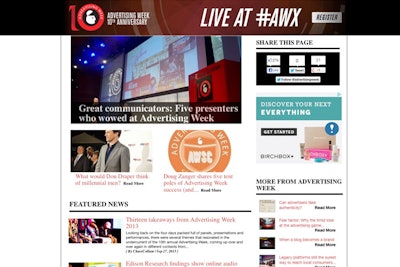
Brands such as Coca-Cola, Kraft Foods, and Red Bull use content marketing—creating and publishing information without a hard sell—to build recognition, trust, and loyalty. Planners also can try the technique to generate buzz and excitement before, during, and after an event.
Events such as Advertising Week and Ad:Tech have enlisted the help of PulsePoint, a content creation and media technology company, to create what it calls “EventHubs”—branded Web sites that include interviews with speakers and sponsors, articles about industry trends, videos, and photo galleries. The content is written by contributors to Allvoices.com, PulsePoint’s community of 650,000 writers.
“Because we have access to that many writers, we are able to put together teams of specialists who are interested in the category that the event is focusing on,” says PulsePoint vice president Andrew Stark. "The team understands the overall emphasis of the event and then writes about what they find interesting. This leads to genuine and engaging content as opposed to a press release, for example."
The writers work with a PulsePoint editor to develop the editorial lineup. “The client can suggest can you interview this person or this company, but there’s no defining what that story would be about, and the client does not see the stories prepublication,” Stark says.
In the case of Advertising Week, which took place September 23 to 27 in New York, the EventHub went live about 45 days before the event, and a team of five writers posted new articles almost daily. The site included social sharing tools and a link to the Advertising Week registration site. During the event, the site became a source for real-time show news as a team of four reporters and a videographer filed about 60 stories and 10 videos, including session coverage, interviews with speakers and attendees, and social media highlights. Writers posted follow-up stories after the event, and the site remains live today, although Stark says it will likely come down soon.
Ad:Tech makes its EventHub a permanent engagement platform. In the weeks leading up to its annual events in San Francisco and New York, the site focuses on show-related topics. The remainder of the year, PulsePoint’s writers produce about 25 articles a month on general advertising technology topics. During the 2012 Ad:Tech event in New York, the site had more than 350,000 unique visitors in three days and more than 10,000 social shares. So far in 2013, the site has logged more than three million page views.
“The number one benefit that Ad:Tech gets is the S.E.O. [search engine optimization]. If you search for Ad:Tech organically, the first 10 or 12 entries are about our event and they are led from the EventHub. So whether someone is searching for ‘ad tech’ in the sense of advertising technology generically, or the event itself, we pop up right away,” says Ad:Tech marketing director Nicole Buraglio. “The EventHub sits out there and helps us drive registrations and conversions without us having to do anything.”
While the EventHub platform is optimized for S.E.O., Stark says the traffic is fueled by content that is interesting and relevant. “We are not writing articles specifically to create S.E.O. juice. We are writing articles to be engaging for a potential reader," he says. "There’s a big difference. This is not a service where we provide articles so the search engine can find the client’s site. We are doing it to make a connection with the audience."
Ad:Tech also generates traffic to the EventHub by sharing three headlines in emails it sends in the weeks leading up to its events. Clients can also share the content on their Web sites and through social media. Stark says many of the individuals and companies that are interviewed also share the articles through their social networks.
In addition to generating registrations and excitement for the featured event, the online content also engages the virtual audience. “Having this extends the life of the event beyond the city that it’s in,” says Lindsay Boesen, PulsePoint’s director of marketing. "It’s a great way for the event creator to allow people who can’t be there in person to really experience it."



















